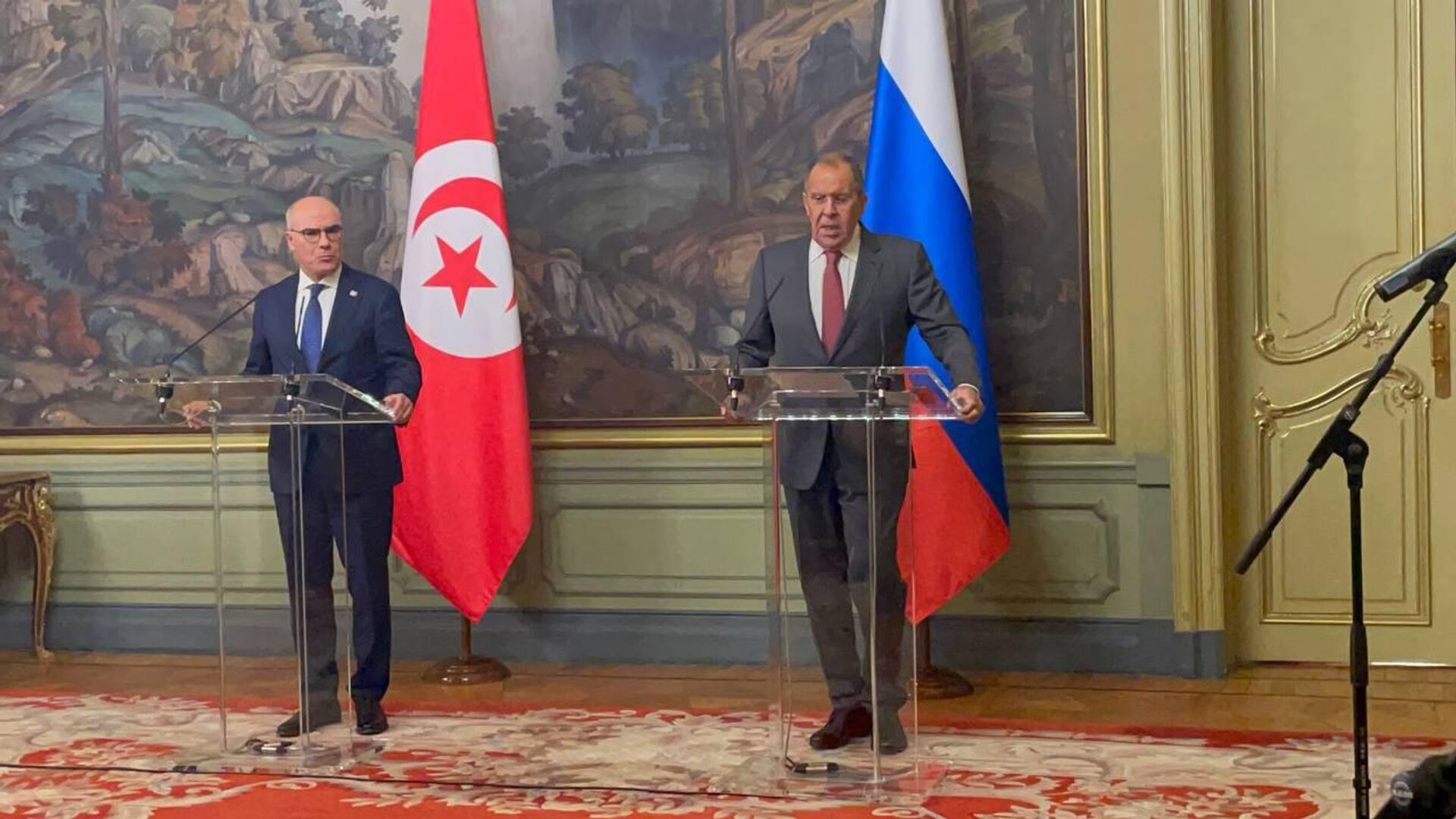https://en.sputniknews.africa/20230926/tunisia-to-negotiate-with-imf-but-should-not-endanger-stability-fm-to-sputnik-africa-1062359793.html
Tunisia to Negotiate With IMF, But 'Should Not Endanger Stability': FM to Sputnik Africa
Tunisia to Negotiate With IMF, But 'Should Not Endanger Stability': FM to Sputnik Africa
Sputnik Africa
On Tuesday, Tunisia's top diplomat Nabil Ammar arrived in Moscow for a two-day working visit at the invitation of his Russian counterpart Sergey Lavrov... 26.09.2023, Sputnik Africa
2023-09-26T12:51+0200
2023-09-26T12:51+0200
2023-09-27T15:01+0200
sergey lavrov
russia-africa cooperation
kais saied
tunisia
moscow
international monetary fund (imf)
north africa
finance
https://cdn1.img.sputniknews.africa/img/07e7/09/1a/1062360505_0:0:1280:720_1920x0_80_0_0_7695338eea941a51390b50050c9725e2.jpg
The Tunisian government is going to continue contacts with the International Monetary Fund (IMF), while focusing on protecting the interests of the country and its people, Tunisian Foreign Minister Nabil Ammar told Sputnik Africa at the joint press conference after the talks with Lavrov.According to the minister, although the country has never stopped contacts with the IMF and is ready to negotiate with the lender, there are certain "red lines" in matters of interaction that can't be crossed and should be discussed.Bailout talks between the international lender and Tunisia have been stalled for months, with the United States and France in particular, demanding far-reaching reforms from President Kais Said to unlock the money. However, the leader disagrees with the conditions under which the organization is offering financial aid to the North African country.In April, the president expressed his clearest rejection of the terms of a $1.9 billion IMF bailout package, which among other things include cuts to food and energy subsidies and a reduction in the public wage bill. Noting that subsidy cuts could lead to social unrest, Saied stressed that he would not accept "diktats."Asked whether Tunisia plans to reorient its foreign policy toward the East and toward partnerships based on mutual respect, Ammar noted that his country does not have a tradition of abandoning one partner in favor of another. The nation maintains open channels of discussion, partnership and cooperation with all its partners, he added.In particular, he said that Tunisia is ready to develop relations with Russia in all areas of partnership. The minister noted that Tunisia's relations with Russia have developed at all levels, including cultural and humanitarian issues. Ammar emphasized that all areas of cooperation are open for strengthening, and there are no exceptions or obstacles for the nations to move forward in their interaction.At the press conference, Lavrov, in his turn, noted that Russia and Tunisia are discussing the expansion of Russian grain supplies to the North African country.The Tunisian foreign minister arrived in Moscow on an official visit earlier in the day.On July 18, the Turkey- and UN-mediated Black Sea Grain Initiative, which provided for a humanitarian corridor to allow exports of Ukrainian grain over the past year, expired, as Russia did not renew its participation in the deal. Moscow emphasized that the deal's component on facilitating Russian grain and fertilizer exports had not been fulfilled and that most of the supplies were ending up in rich European states instead of in countries that most required them.After the deal expired, Russian President Vladimir Putin gave assurances that Moscow would continue to supply grain and fertilizers to African countries despite sanctions.Earlier, Lavrov said that negotiations on the continuation and expansion of Russian grain supplies to Tunisia are currently taking place in Moscow. He also added that the two countries agreed on the supply of Tunisian agricultural and textile products to the Russian market.
https://en.sputniknews.africa/20230802/russia-prepares-trade-agreements-with-egypt-morocco-tunisia-1061009957.html
tunisia
moscow
north africa
Sputnik Africa
feedback@sputniknews.com
+74956456601
MIA „Rossiya Segodnya“
2023
Sputnik Africa
feedback@sputniknews.com
+74956456601
MIA „Rossiya Segodnya“
News
en_EN
Sputnik Africa
feedback@sputniknews.com
+74956456601
MIA „Rossiya Segodnya“
Sputnik Africa
feedback@sputniknews.com
+74956456601
MIA „Rossiya Segodnya“
sergey lavrov, russia-africa cooperation, kais saied, tunisia, moscow, international monetary fund (imf), north africa, finance
sergey lavrov, russia-africa cooperation, kais saied, tunisia, moscow, international monetary fund (imf), north africa, finance
Tunisia to Negotiate With IMF, But 'Should Not Endanger Stability': FM to Sputnik Africa
12:51 26.09.2023 (Updated: 15:01 27.09.2023) Exclusive
On Tuesday, Tunisia's top diplomat Nabil Ammar arrived in Moscow for a two-day working visit at the invitation of his Russian counterpart Sergey Lavrov. According to the North African country's Foreign Ministry, the topics of the bilateral talks include cooperation between the two countries and the most topical issues on the international agenda.
The Tunisian government is going to continue contacts with the International Monetary Fund (IMF), while focusing on protecting the interests of the country and its people, Tunisian Foreign Minister Nabil Ammar told
Sputnik Africa at the joint press conference after the talks with
Lavrov.
According to the minister, although the country has never stopped contacts with the IMF and is ready to negotiate with the lender, there are certain "red lines" in matters of interaction that can't be crossed and should be discussed.
"We have never said that we cease any contacts with the IMF; we have certain conditions and we have to be clear - the protection of the country, the protection of the most vulnerable citizens – these are redlines… these are redlines we are willing to negotiate," he said.
Bailout talks between the international lender and Tunisia have been stalled for months, with the United States and France in particular, demanding far-reaching reforms from President Kais Said to unlock the money. However, the leader disagrees with the conditions under which the organization is offering financial aid to the North African country.
In April, the president expressed his clearest rejection of the terms of a $1.9 billion IMF bailout package, which among other things include cuts to food and energy subsidies and a reduction in the public wage bill. Noting that subsidy cuts could lead to social unrest, Saied stressed that he would not accept "diktats."
"We are carrying out the necessary reforms, but we must not jeopardize the stability and security of our country by applying recipes that, as we have seen very well in other countries and at other times, led to completely disastrous results," the minister said, stressing: "The IMF must serve the countries and not the other way around."
Asked whether
Tunisia plans to reorient its foreign policy toward the East and toward partnerships based on mutual respect, Ammar noted that his country does not have a tradition of abandoning one partner in favor of another. The nation maintains open channels of discussion, partnership and cooperation with all its partners, he added.
In particular, he said that Tunisia is ready to develop relations with Russia in all areas of partnership. The minister noted that Tunisia's relations with Russia have developed at all levels, including cultural and humanitarian issues.
"Tunisia and Russia have always maintained a good level of relations in a wide variety of areas, including culture and humanitarian issues [...]. Russia is an important partner for us, and we want to develop relationship with this country," he said.
Ammar emphasized that all areas of cooperation are open for strengthening, and there are no exceptions or obstacles for the nations to move forward in their interaction.
At the press conference, Lavrov, in his turn, noted that Russia and Tunisia are discussing the expansion of Russian grain supplies to the North African country.
"We also separately discussed the prospects for organizing purchases of Russian grain. The first batch has already been delivered to Tunisia. The [Tunisian] minister's delegation includes the head of a Tunisian grain company, who is currently holding talks at the Russian Ministry of Agriculture on the terms of further deliveries and their expansion," Lavrov said at a joint press conference after his meeting with Tunisian Foreign Minister Nabil Ammar.
The Tunisian foreign minister arrived in Moscow on an official visit earlier in the day.
On July 18, the Turkey- and UN-mediated Black Sea Grain Initiative, which provided for a humanitarian corridor to allow exports of Ukrainian grain over the past year, expired, as Russia did not renew its participation in the deal. Moscow emphasized that the deal's component on facilitating Russian grain and fertilizer exports had not been fulfilled and that most of the supplies were ending up in rich European states instead of in countries that most required them.
After the deal expired, Russian President Vladimir Putin gave assurances that Moscow would continue to supply grain and fertilizers to African countries despite sanctions.
Earlier, Lavrov said that negotiations on the continuation and expansion of Russian grain supplies to Tunisia are currently taking place in Moscow. He also added that the two countries agreed on the supply of Tunisian agricultural and textile products to the Russian market.


